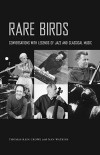Rare Birds: Conversations with Legends of Jazz and Classical Music (University Press of Mississippi, 2008) by Thomas Rain Crowe with Nan Watkins is a rare collection: Six interviews featuring musicians Philip Glass (minimalist composer), Eugene Friesen (cellist, composer), Charles Lloyd (jazz saxophonist, composer), Abdullah Ibrahim (pianist, composer), Sathima Bea Benjamin (vocalist, composer) and Steve Reich (pioneer minimalist composer).
Birds is at turns precise and expansive, impressive and inspiring, welcoming and intimidating. Each interview (with the exception of the chapter dedicated to Benjamin, which is an essay) is comprised of heady questions. The musicians’ responses are captured in whole. Editing for readability seem to have happened (Birds is nothing if not immaculately edited) but otherwise the answers were allowed to span paragraphs and pages, unhindered.
That being the case, the casual reader might have difficulty with Birds. It’s a heady work, rather like the late-night philosophical ramblings of PhD candidates with nowhere to be in the morning and a cache of good wine for motivation. But, even with biographical and introductory leads to each chapter, the jazz or classical music novice might be left in the dust—especially with Crowe’s especially esoteric queries (“One of the things that has caught my attention over the years is a concept/idea that I call ‘radiogenesis,’” he tells Lloyd. “It has to do with transmission and translation in terms of the creative process. More specifically, it has to do with the material that seems more to come through you than come from you … .”) Toto, I don’t think we’re on iTunes anymore.
The chapter on Benjamin (“An African Songbird in New York”) is, for this reader, the most interesting and fully realized profile. The story, culled from Watkins’ interviews with the vocalist, was crafted for publication in Jazz News and interweaves biographical details with of-the-moment quotes: “Benjamin admits, ‘Without the music I would be dysfunctional and maybe a bit mad. It was the songs that took me out of myself and let me forget the pain.’ The pain began as a young girl of four in Cape Town when her parents divorced.”
The rest of Birds is much less accessible, and the book often falls victim to pretension. Crowe, a noted author and poet, drops names (to Glass: “In San Francisco during the mid-1970s, there was a group of poets and artists—of which I was one—connected with the resurrection of Beatitude magazine;” to Lloyd: “I was living in San Francisco during the seventies, publishing a Beat poetry magazine called Beatitude, which was started by Bob Kaufman in the fifties” and “I, too, spent some time down in Big Sur at Ferlinghetti’s cabin;” to Ibrahim: “A new book of my versions from The Divan of the fourteenth-century Persian poet, Hafiz, has just been published”) often enough to sound like he’s on a self-promotion campaign. Sure, Crowe’s considerable literary erudition provides a base of knowledge from which he draws his questions—and Birds is better for that. But by working that personal history into the text, Crowe risks grandstanding.
The other issue with Birds is that the bulk of the material within was collected more than a decade ago (articles on Glass and Friesen were both published in 1990). In this, the information age, a 10-year-old interview seems dated. Given that Crowe and Watkins’ subjects are living artists, updates to these collected interviews would have been a nice touch, bringing all of the work into the 21st century.
That said, Birds does carry the weight of importance. These are paramount figures in modern art, and that Crowe and Watkins took the time to capture each of these musicians in their individual primes is an accomplishment. Fans of contemporary jazz and classical music will feel fortunate to be able to commune with such great minds among the pages of Birds.
Thomas Rain Crowe and Nan Watkins read and discuss Rare Birds at Malaprop’s on Sunday, Feb. 22, The 3 p.m. event is free.
—A lli Marshall, A&E reporter



Before you comment
The comments section is here to provide a platform for civil dialogue on the issues we face together as a local community. Xpress is committed to offering this platform for all voices, but when the tone of the discussion gets nasty or strays off topic, we believe many people choose not to participate. Xpress editors are determined to moderate comments to ensure a constructive interchange is maintained. All comments judged not to be in keeping with the spirit of civil discourse will be removed and repeat violators will be banned. See here for our terms of service. Thank you for being part of this effort to promote respectful discussion.